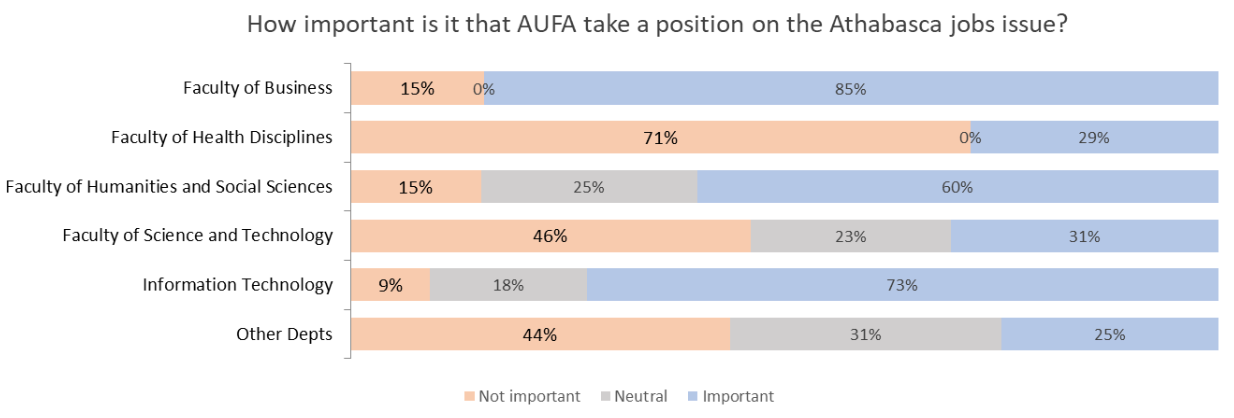Our Position
We are writing on behalf of AUFA and its members to express our strong opposition to the renewal of Dr. Matthew Prineas’ term as Provost at Athabasca University. The Provost is a pivotal academic role in the university, and is central to providing space for an academic community to flourish, but also for building an equitable and supportive workplace enabling all employees to do excellent academic work. Under Matthew Prineas’ watch, AUFA has seen exponential growth in issues culminating in grievances that expose AU’s toxic workplace culture and a diminishment in our ability to be leaders of academic excellence.
The recent employee engagement survey report supports this position, in addition to what members are telling us directly. AUFA is extremely concerned about chronic low staff morale, deteriorating mental health of members, and the routine exclusion of staff from key decisions that impact the future of Athabasca University. The lack of engagement from the Provost with faculty and significant challenges faced by them has undermined their ability to be responsive to students, work collegially, or even maintain good health.
Failures to Deliver on Justice, Equity, Diversity, and Inclusion (JEDI)
AUFA is alarmed by the record number of serious grievances reporting discrimination, harassment, and harm being experienced by our members. In response, instead of addressing these concerns in a collegial manner, they are ignored and consequently require being escalated to arbitration to attract any meaningful response from HR. Worse, the Collective Agreement, Article 7: Discipline, is being used to target and isolate members, particularly pre-tenure, equity-deserving members, in response to reported conflicts, all under the watch of Dr. Prineas acting as the primary executive officer responsible for overseeing affected members. The pattern can be named: it is systemic institutional racism.
After decades of institutional inaction, over the last year AUFA and its members have repeatedly raised concerns, naming serious equity issues. These concerns continue to remain unaddressed, or at best received vague and ill-defined responses. The incumbent Provost has refused to engage with AUFA members on the development of an equity office, signed on to the Scarborough Charter without meaningful commitment to supporting the flourishing of Black academics and staff members, and made empty promises on moving forward with conciliation with and active support of Indigenous Peoples, including with our own faculty and staff members.
AU needs a diverse faculty to engage with a diverse student population, including at the graduate level. The Provost has failed to attract and retain a diverse faculty, and members of equity deserving groups are grossly underrepresented at AU. As an academic institution that purports to support EDI and decolonization, AU is at odds with its Mission to reduce barriers to education. The lack of active engagement on issues of JEDI is jeopardizing AU’s responsibilities to the Tri Council policies on Equity, the Scarborough Charter, and the TRC Calls to Action, which now invites significant reputational harm to AU and its faculty.
The ILE Debacle and Unsustainable Mismanagement
While the ILE promised much, under the management of the Provost, it has delivered little. The result to date is a general sense that the expertise and knowledge of staff members is irrelevant, and managerialism has been allowed to run amok, stifling true innovation. Massive financial investment in the ILE project has deprived faculties from maintaining their staff complements, and workloads for those who remain are increasingly unmanageable. While enrolments continue to drop, payouts to departing executives are up, and executive positions have ballooned.
The disproportionate emphasis on MSCHE accreditation, at the expense of reaching underserved Albertans, most notably Indigenous, single-parent students, and students seeking accommodations for learning differences is disappointing. This misuse of faculty time and resources is a demonstration of yet another ill-conceived project of the Provost. While AU employees have asked for an analysis of the benefit of this program, the Provost has provided nothing.
Our members collectively hold extensive institutional memory. From our perspective, the Provost has much to answer for in the lackluster performance of the entire executive team, particularly with the management of the Human Resources Department. We have watched HR extend its scope into affairs that normally function under the purview of the VP Academic, making decisions that used to be part of a functioning collegial governance model. Reliance on external legal investigations of our members based on specious allegations is particularly troubling.
The Provost has managed an embarrassing and harmful EDI and decolonization response, and led us toward the current unsustainable financial trajectory. While attention has been devoted to failing projects, the lack of institution-wide strategic and academic planning itself is a cause for alarm. We therefore implore the Provostial Review Committee to weigh these concerns, and rather than acquiesce to Dr Prineas’ appointment renewal, to put the needs of AU’s faculty and students first and foremost. We deserve better.
A Call to Members to Respond
The reappointment of a Provost is subject to AU’s Appointment and Reappointment of Academic Vice-Presidents Policy, and related procedure. Under this Policy, a call out and election are required for appointment of committee members (Section 4.10). This process is part of required collegial governance and provides an important opportunity to hear from each faculty.
The President has further invited each of us as valued community members to provide written contributions to the renewal committee. We encourage members to write individual submissions, which are impactful in ways an Open Letter may not be. Feel free to elaborate what’s most important to you, and why.
Signed, written contributions should be submitted in confidence to the committee at provostrenewalsubmissions@athabascau.ca by Monday, April 17, 2023 at 4:30 p.m. (Mountain).







